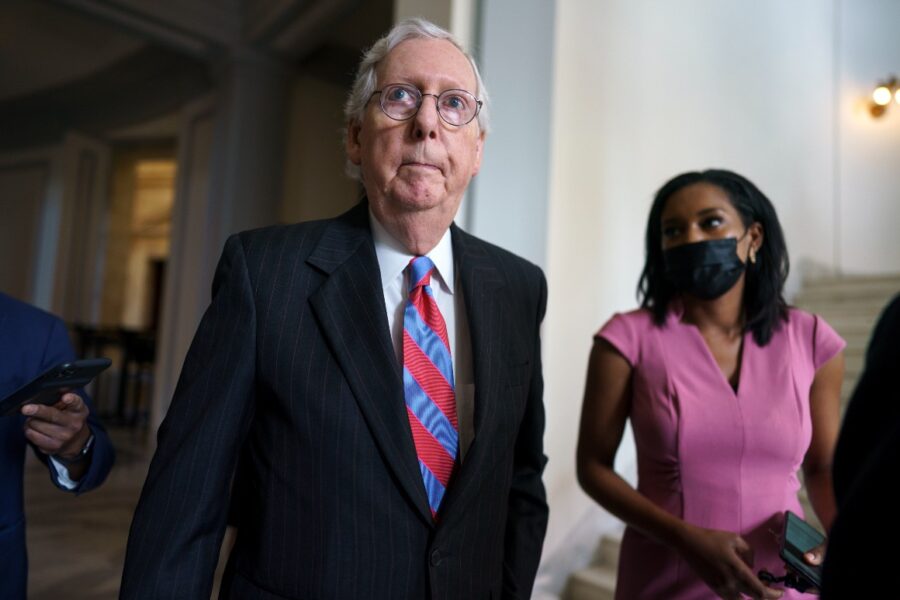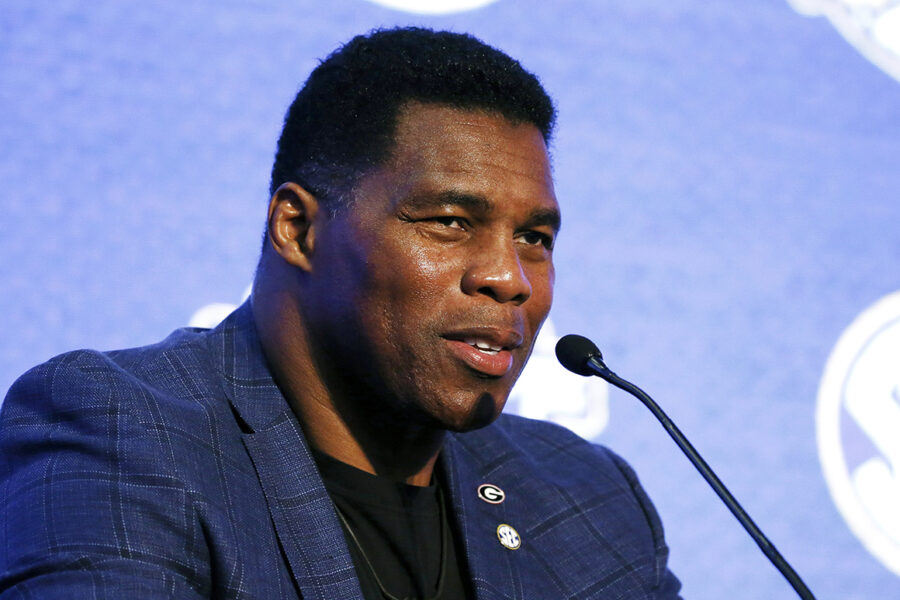McConnell warms to Herschel Walker as primary war with Trump fizzles

Republicans are hand-wringing over former President Donald Trump’s hand-picked candidate Herschel Walker entering a critical Senate race. Surprisingly, Mitch McConnell isn’t one of them.
After vowing earlier this year to tangle with Trump if necessary to nominate electable GOP candidates in must-win Senate primaries, the Senate minority leader is tacitly blessing many of Trump’s endorsements. As McConnell surveys Trump’s picks in Senate battlegrounds, he’s concluded that “I don’t believe they’re troubling.”
McConnell even sees a path to victory for Walker, the former NFL star who is dogged by allegations of past erratic behavior, including threats to his ex-wife. Trump essentially recruited Walker in Georgia, making him the instant favorite to win the GOP nomination. And McConnell is OK with that.
“There are some things written that indicate he’s had some challenges in his life. On the other hand, the good news is, he’s made several impressive performances on national television. His whole team is the same team around [former Sen.] Johnny Isakson,” McConnell said in an interview this week. “He’s called me; we had a good conversation. I think there’s every indication he’s going to be a good candidate.”

Republicans across the country will sigh in relief at McConnell’s remarks as Trump prepares to rally with Walker in Georgia on Saturday. McConnell hasn’t personally reconciled with Trump after excoriating him for ginning up the pro-Trump insurrection at the Capitol on Jan. 6. But the apparent midterm clash between the two hasn’t materialized and may never — even as Trump continues a push to oust McConnell as Republican leader.
The only real political conflict between the two GOP titans at the moment is in Alaska, where McConnell said his party will do whatever it takes to defend incumbent Republican Sen. Lisa Murkowski while Trump seeks to topple her. McConnell otherwise doesn’t view Trump’s endorsements of Walker, Sean Parnell in Pennsylvania, Rep. Mo Brooks in Alabama, Rep. Ted Budd in North Carolina and Adam Laxalt in Nevada as counterproductive to taking back the majority.
Asked about Brooks, a conservative firebrand who has antagonized party leaders for years, McConnell replied: “He’s a Republican, isn’t he? The magic number is 51.”
And if GOP leaders have any closely held problems with any of those candidates, they aren’t serious enough to prompt an internal civil war with the former president.
“I don’t see Sharron Angle, Christine O’Donnell, Todd Akin or Richard Mourdock out there,” McConnell said, referring to toxic Republican Senate nominees who blew winnable races in 2010 and 2012. “I don’t think there’s much chance we’re going to end up with a nominee who can’t win in November.”
Still, Sen. John Cornyn (R-Texas), who ran the National Republican Senatorial Committee in 2010 and 2012, said it’s “still kind of early” to judge whether the party would coalesce around nominees who could be anchors in a general election. The NRSC is officially neutral in open primaries this cycle, even as Trump offers his blessings in contested races.
Republicans only need to net one seat to gain back the Senate majority, though it’s also possible they could lose seats given a map that’s forcing them to defend seats in Biden-won states like Wisconsin and Pennsylvania. It’s a less favorable battlefield than 2018’s midterms, when Senate Republicans gained seats even as House Republicans were clobbered and lost the majority.
McConnell described next year’s Senate battle as a “50/50 proposition.” Republicans are defending more territory, but Democrats face the challenge of trying to hold onto a narrow majority in a midterm election that’s historically rough on Washington’s governing party.
“We’re going to have … a referendum on the Biden administration. Everything he’s doing so far is probably exacerbating the natural buyer’s remorse that typically sets in two years into an administration,” McConnell said, mentioning the southern border, Afghanistan and Democrats’ spending plans.
McConnell declined to comment on whether Trump would help him take back the majority. He hasn’t talked to the former president since December, when he declared Joe Biden the duly elected president amid Trump’s false claims of a stolen election.
Democrats like Sen. Gary Peters (D-Mich.), who chairs the party’s Senate campaigns arm, dismiss Republican crowing over the deteriorating environment around Biden’s approval ratings more than a year before Election Day:
“It’s way too early … I’m not concerned,” said Peters, who added that Republicans “are trying to prove they’re the most loyal to Donald Trump, I don’t think it’s going to be a good strategy for them.”
The Senate map is also not fully formed. McConnell is waiting on key decisions from four of his incumbents on their reelection campaigns. McConnell said he wants Sens. Ron Johnson (R-Wis.), Chuck Grassley (R-Iowa) and John Thune (R-S.D.) to run again and would go all-out to protect Murkowski. Grassley announced Friday he would seek re-election.
“We’re all in for Lisa. In every way. Senate Leadership Fund, NRSC, we’re all in for Lisa. I think she’ll have a competitive race,” McConnell said. Senate Leadership Fund is the main GOP super PAC for Senate races.
Republicans are also hoping to corral two high-profile governors who could change the complexion of the Senate map if they challenge Democratic incumbents. If GOP Govs. Doug Ducey of Arizona and Chris Sununu in New Hampshire take on Democratic Sens. Mark Kelly and Maggie Hassan, respectively, McConnell made clear those two candidates would be his preference in those races. (This comes as Trump says warm words about Don Bolduc in New Hampshire.)
McConnell sees the Senate map’s top battlegrounds as Democratic-held seats in Georgia, New Hampshire, Nevada and Arizona and GOP held-seats in North Carolina, Pennsylvania, Ohio, Wisconsin and Missouri. He omitted Colorado, where Sen. Michael Bennet (D) is running for reelection in a state that’s trended Democratic in recent years.
And despite McConnell’s sunny view of Trump’s endorsements, some races are getting ugly. In Pennsylvania, Jeff Bartos has called Parnell “unelectable” because his wife sought protective orders against him several years ago. Outgoing Sen. Pat Toomey (R-Pa.) said he’s still weighing whether to endorse a potential successor and conceded the fighting between the GOP rivals is “is not anything you enjoy seeing.”
Retiring senators have bucked Trump’s picks elsewhere, with Sen. Richard Burr (R-N.C.) backing former Gov. Pat McCrory over Budd and Sen. Richard Shelby (R-Ala.) backing his former chief of staff Katie Boyd Britt over Brooks. McConnell and the NRSC, however, are not going there.
In a 50-50 Senate, every race matters. McConnell laments that if his party had held one of the seats in Georgia it would have shut down Democrats’ $1.9 trillion coronavirus relief bill and the $3.5 trillion social spending bill currently under discussion. But the self-appointed “grim reaper” of the Senate said his party isn’t necessarily running on a platform to stop Biden on everything.
McConnell cooperated with Biden on infrastructure, for example, but is refusing to throw the president a lifeline on the debt limit, whipping his members to block an increase unless Democrats pass one via a party-line vote. He’s also worked with Democrats on a competitiveness bill and hate crimes legislation.
“If you look at 2014, which is a good Republican year, we ran against Obama. But we also did business with him. The 21st Century Cures bill, Trade Promotion Authority,” McConnell said, referring to a health care modernization bill and a free-trade vote.
Of course, the Kentuckian also prevented former President Barack Obama from filling a Supreme Court seat once he had the majority. In some ways, Biden’s ability to confirm a high court nominee if Justice Stephen Breyer retires is the biggest prize next year.
If Democrats lose one seat or more next year and there’s a Supreme Court vacancy under divided government, would McConnell again mount a blockade?
“Cross those bridges when I get there, we are focusing on ‘22,” McConnell said. “I don’t rule anything in or out about how to handle nominations if I’m in the majority position.”
Go To Source
Author: POLITICO

